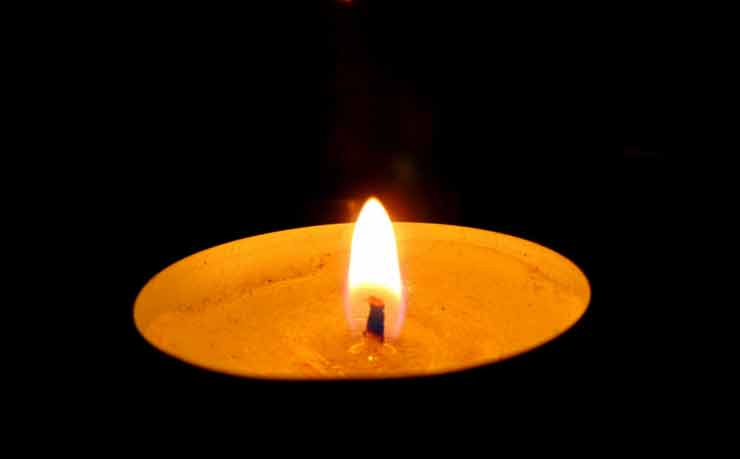‘Mindfully detaching’ from the tsunami of toxic sludge that surrounds you so that you can dispassionately observe it kind of misses the point… which is you’re surrounded by a tsunami of toxic sludge and that’s why you think you need ‘mindfulness’. Tim Deane-Freeman takes aim.
Allow me to begin by stating clearly that I am not an expert in the field of mental health. I am neither a practitioner nor a student of psychology, and as such invite correction or response from those involved more concretely in the field. I am, however, a long-term sufferer of ‘mental illness,’ and somebody who has travelled on that well-worn path, familiar to so many Australians, from therapist to therapist, medication to medication, through a series of clinical vogues and cycles. A fact I hope, at the very least, affords my observations a certain lived utility.
Rest assured, I’ve no intention of speaking autobiographically. Indeed, the supposition that mental health is best understood in terms of a ‘personal journey,’ as opposed to a broad set of socio-political problems, is exactly what I want to reject here.
The futility of speaking in terms of ‘my experience’ lies in the figures. The National Mental Health Commission’s 2012 Report Card on Mental Health and Suicide Prevention worked on authoritative assumptions that around 45% of the Australian adult population would suffer from mental illness at some point in their lives, or that one in five (3.2 million) Australians would experience a mental health problem in any given year.
In 2015, 3,000 people died by suicide in Australia, with First Nations Australians between the ages of 15-24 four times as likely to die in this way as their non-Aboriginal peers (National Mental Health Commission 2016 Report on Mental Health and Suicide Prevention). On these numbers, there’s a good chance mental illness is your experience too.

Such statistics always arrive with a whiff of redundancy. We all know, by virtue of our daily lives, how profound is the problem. To be alive today is to be touched, in some way, at some time, either personally or through another, by anxiety, depression, bipolar disorder, alcoholism, sleep disorders, psychosis, suicide.
As such, our dogged insistence on viewing the problem as purely medical, personal, or at best social, seems on the face of it, bizarre. Clearly the problem is also political, once politics is understood in the classical sense, as the collective arrangement of society in order to accommodate the broadest possible access to the ‘good life.’
The recent history of responses to mental illness is profoundly marked by this oversight. Following the slow ebb of the grim 19th century practise of imprisonment and torture of the ‘mad,’ Freudian psychoanalysis emerged in the first half of the 20th century as the primary theoretical and clinical method for understanding mental illness.
The psychoanalytic paradigm, in which mental disturbance arises primarily out of the traumatic experiences of childhood – which must therefore be analysed in-depth through interminable sessions ‘on the couch’ – was ousted through the mid-to-late 20th century by pharmacological and cognitive behaviourist approaches.
These, very broadly, instead viewed mental health in terms of the balance or imbalance of our system of neuro-chemical pathways and our ‘maladaptive’ responses to the world.
More recently, and following the interventions of Jon Kabat-Zinn, the practise of ‘mindfulness’ – a melange of cognitive behaviourism and a certain mangled interpretation of Buddhist meditation – has enjoyed breakaway popular success in the West. As the introductory page at mindful.org – one of a plethora of online resources dedicated to this burgeoning method – opines:
The aim of mindfulness is not quieting the mind, or attempting to achieve a state of eternal calm. The goal is simple: we’re aiming to pay attention to the present moment, without judgement. Easier said than done, we know…
As a clinical response to stress, anxiety and depression, mindfulness emphasises the importance of living in the present moment, with a disposition of simultaneous attention and detachment, attained through meditative exercises involving a focus on breath, physiology and calming images.
Cognitive and neurological sciences have confirmed its efficacy. Indeed, its broad success as both a theoretical and clinical tool has seen it proliferate beyond medicine. As J. Mark G. Williams and Kabat-Zinn write:
Someplace in the late 1990s, the rise [in publications on mindfulness]began to go exponential, and that exponential rate continues. Interest and activity is no longer limited to the discipline of behavioural medicine, or mind/body medicine, or even medicine. Major developments are now occurring in clinical and health psychology, cognitive therapy, and neuroscience, and increasingly, there is growing interest, although presently at a lower level, in primary and secondary education, higher education, the law, business and leadership. (Williams, Kabat-Zinn, Mindfulness: Diverse Perspectives on its Meaning, Origins and Applications, 2013)
All this is not to mention the incredible vogue mindfulness now occupies as a lifestyle brand beyond the medical sphere, a fact to which most Facebook newsfeeds will attest.
Given the prevalence of mental illness, this development will no doubt be welcomed as a robust new tool in our struggle to keep Australians healthy. If, however, we understand mental health to be at least as much a cultural and social problem as it is personal or medical, the proscription that one should experience “without judgement” begins to appear perhaps a little sinister.
The political fact of the matter is, we live in a singularly difficult world. Caught between the promises of rampant consumer capitalism and the grim materiality of labour, between the organic needs of our bodies and the deeply internalised pressures of socialisation, between the fractious expectations of families, lovers, employers and of states, we have good cause to emerge anxious or depressed.
Life is hard.
A contemporary Western life, of uncertain employment, impending global catastrophe, absent meanings, an apparent lack of agency, all of it grounded by the strange guilt of knowing we have it better than most of the people who have ever lived, is very hard indeed.

This is the central thesis advanced by the now thoroughly unfashionable Sigmund Freud in Civilisation and its Discontents (1930), in which he seeks:
…to represent the sense of guilt as the most important problem in the development of civilisation, and to show that the price we pay for our advance in civilisation is a loss of happiness through the heightening of the sense of guilt.
Freud’s claim, that our restraint of certain primordial desires in the service of social life leaves us fundamentally unhappy, certainly has an archaic ring today. It is not, of course, a simple matter of a correlation between increasing ‘civilisation’ (whatever that is) and decreasing ‘happiness,’ – although, as so often with Freud, there is a kernel of truth here – however what remains relevant in Freud’s work is his essential observation that one’s psychology is always and fundamentally the product of one’s environment.
What is astonishing about mindfulness, as with similar mental health paradigms, is its complete refusal to engage with any thought of changing that environment. The sheer prevalence of mental illness today must surely contextualise our medical, cultural and public policy responses. It is not ‘chemical imbalance,’ nor an ‘inability to live in the present’ but the collective structure of our very lives which causes mental distress; unless we hope to argue that First Nations Australians or victims of the recent Centrelink ‘Robo-Debt’ campaign are particularly chemically imbalanced, particularly prone to neglecting their present surroundings.
The ‘mindful’ paradigm, with its injunction that we should strive to live thoroughly in the present, is at profound odds with the true temporality of politics (and by this I mean real politics, not what passes for it today in Canberra) which should ceaselessly seek lessons from the past for the purposes of affecting change into the future. This is the very meaning of judgement, which mindfulness would have us evacuate in favour of a placid detachment which might return us sooner to work.
I don’t mean, here, to pick on mindfulness specifically. It follows the same practical exigencies as cognitive behavioural therapy and medication, in trying essentially to make people’s lives more manageable.
I have no doubt it has helped many people, in the same way as medication has helped me.
It does, however, exemplify a profound tendency in our conception of mental illness, to completely depoliticise its incidence, seeking the quickest and most cost-effective means of returning the patient to functionality within a certain (neo-liberal) milieu. It certainly does not afford us a means of assessing the extent to which this milieu itself may be the problem.
The interrelation of social and economic factors with mental illness is diabolically complicated. While a great deal of research supports an overt link between social disadvantage and mental illness (Dohrenwend, Faris and Dunham, Hollingshead and Redlich, Muntanter et al.), there is evidence, at least in the US, that perhaps the highest incidence is to be found in so-called ‘contradictory class locations’ like the upper middle class (Prins et al.).
The conclusion we should draw here is not that social strata are irrelevant, but that neo-liberal, capitalist societies make us feel alienated and anxious no matter where we are located within them, as economist Lila Antonopoulou writes:
The employees in the countries of advanced capitalism are more and more possessed by a sentiment of insecurity in relation to the prospects of keeping their job, while the intensification of manual, and also of intellectual work, constitutes a fertile ground for the creation of mental disorders… this new type of employee does not only sell its natural labour power, but also its creativity, imagination and availability. (Ege Academic Review, vol. 9, Issue 3, 2009)
Where does this leave us? I do not propose that those in treatment are better advised to leap to the barricades and bring about a depression-free utopia. These people, I can vouch, have enough to worry about already.
It is, however, important to think critically and politically about the issue of mental health, and to ensure that we are not endorsing methods which completely disconnect it from its social ecology. Such manoeuvres serve the dubious end of making mental health the responsibility of individuals and their families, as opposed to our collective socius and its institutions.
There are concrete applications for this criticality. In the clinical space, psychoanalysis, rarely prescribed under the auspices of Medicare’s ‘Mental Health Treatment Plan,’ takes the difficult path of establishing the social and cultural factors underpinning a patient’s distress.
The length, cost and uncertain outcome of psychoanalytic treatment pose significant obstacles, but it does offer a profoundly underrepresented alternative to the currently dominant CBT and pharmaceutical paradigms.
More broadly, the essential political struggles for a more equitable society, the inclusion of disenfranchised groups, our rejection of prejudice and racism, must be seen to extend into this other battleground, where they are fought out among synapses and neurochemicals.
We must understand our own mental illnesses, and those of friends and family, as produced by social structures in which we all participate, and which we can all work persistently to change, in even in the most modest of ways.
Illness and politics are frequently inextricable, as asbestosis and the return of black lung in Queensland attest. Indeed, it’s worth meditating briefly on the farcical possibility of dealing with asbestosis purely medically, as opposed to fighting it, like Bernie Banton, with a simultaneous and heroic political campaign.
My generation’s dubious inheritance from the baby-boomers – that mixed bag of Hendrix, impossible home ownership and inaction on climate change – includes the worn adage that “the personal is political.” Nowhere does this claim resound as strongly as in the sphere of mental health, where we must come to see our personal struggles as a collective response to the consequences of rampant neo-liberal capitalism, and a culture which emphasises ‘productivity’ over people.
What we must never do, no matter how desperate we become, is accept the present moment without judgement, and defer all thought of a better future.
Donate To New Matilda
New Matilda is a small, independent media outlet. We survive through reader contributions, and never losing a lawsuit. If you got something from this article, giving something back helps us to continue speaking truth to power. Every little bit counts.





